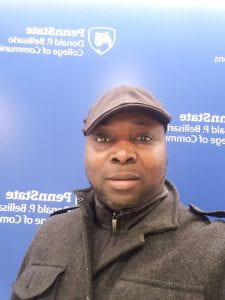By: Byan Althowaini, Film Editor ~
Olusegun Soetan is an assistant teaching professor and a scholar in the Department of African Studies here at Penn State. He teaches courses pertaining to African films, African cultural studies, Gender and Women’s Studies and more. Besides his teaching life, Soetan is a photographer, novelist and poet.
I had the pleasure of enrolling in Dr. Soetan’s Africa in Cinema (AFR 150) course in fall 2019. This course heavily focuses on Nollywood, a term used to describe the Nigerian film industry. Shortly after taking the course, I became attached to films, especially films set in the continent of Africa.
I was able to speak with Professor Soetan in early April to discover more about his background and interest in film, as well as what brought him to teach at Penn State.
Note: This interview has been edited for clarity and conciseness.
Byan Althowaini: What made you interested in film?
Olusegun Soetan: I’ve always been interested in capturing time, and freezing moments. I always wanted to create permanent memories, and I was fascinated with the whole idea of time, and how you can pause time so that you can replay it later for people to see. What ultimately drew me in was wanting to see how they (movie producers/directors) tell stories of centuries ago…how they portray the past even in the present.
BA: Have you personally ever produced/directed any films?
OS: I’ve produced one (movie). However, I intend to become a filmmaker and a film scholar simultaneously in the future.
BA: Do you ever imagine any of your novels being turned into a movie?
OS: Yes. I’m particularly interested in the cultural context of gender performances in my Nigerian social and economic landscape. I enjoy writing about women’s empowerment. Those are the kind of films I want to be making. Films that reflect social, political, economic, and cultural marginalization and the coping mechanism little people set up to survive.
BA: What led you to Penn State, and to later teach AFR 150, Africa in Cinema?
OS: Basically, what led me to Penn State was initially a job opportunity. I was looking for a job, and I got one here at Penn State. However, what led me to teach AFR 150 was due to how popular it was in the (African Studies) program. I believe the reason Penn State employed me was due to the fact that I am a scholar in African Cinema. They were searching for somebody who covers that area of expertise.
BA: What’s your most popular course?
OS: Well, I’m undecided because I think my Africa in Cinema (AFR 150) and also African Feminism (WMNST 202N) are both quite popular. Every semester I would get requests from students to increase my capacity. I always have more enrollments in my class, so therefore, I have to allow more students on the waitlist to join my class.
BA: What are your top three movie picks, Nollywood or not?
OS: My top three picks are Shawshank Redemption and Forrest Gump (both of which are American movies), and then the other one from Africa, called Xala by Ousmane Sembène. These three are my go-to films due to the message they get across.
BA: Does Nollywood have a big impact on Nigerian culture? If yes, please elaborate.
OS: Yes. Nollywood came out of the need for filmmakers to begin to reimagine Africa in a new light. Nollywood provides an alternative perspective that counters the stereotypical framing of Africans and People of Color that Hollywood filmmakers were doing. When you think about the blackface minstrelsy in America, the Jim crow, and the total misrepresentation of the African continent, you’ll realize that Americans don’t know about other cultures and places. So, Nollywood came as a reaction to that, as a reaction to wanting to portray authentic Nigerian/African culture. The industry uses the films to tell stories about the postcolonial experiences and realities of Africans while it celebrates the beautiful cultures and customs of the people. It has a significant impact on Nigerian sociocultural perspectives and views.
BA: I recall when taking your AFR 150 course, you mentioned that the Nollywood industry produces many movies per year. Do you think this builds more competition for filmmakers?
OS: Yes, the quantity of production has driven a competition, and that competition was, you know, geared towards producing quality films.
BA: What are the key components that make a film a success?
OS: There are five components of filmmaking. Every filmmaker should master these five elements: narrative, design, graphics, music, and editing.
BA: What do you wish your students that enrolled in your AFR 150 course would take away?
OS: I want them to take away three things. One, I want them to break the barrier of stereotypes. Two, I like my students to take away what I call, “universal humanity.” Universal humanity means that no one race is more important than the other. So all races are important in their own way. Lastly, I want to challenge them to take the class, and after taking the class, travel to at least a few places, so they can encounter more cultures and people. Americans don’t really travel, despite the power of their passport. Traveling provides a kind of global education that formal schooling cannot provide. It will make them a citizen of the world.
